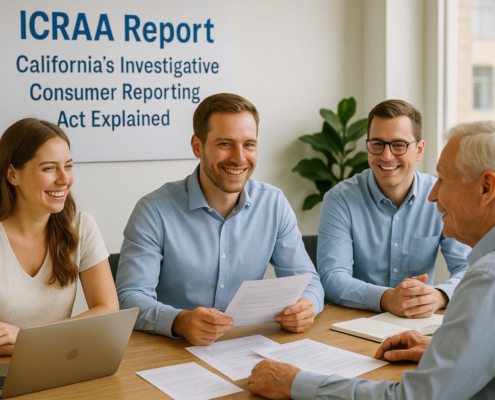Introduction
When it comes to protecting personal information, California stands apart.
The ICRAA (Investigative Consumer Reporting Agencies Act) is a well-known illustration of this. California raises the bar for privacy & consumer rights by strengthening its people’s protections under the ICRAA, in contrast to many other states that rely only on the federal government’s FCRA (Fair Credit Reporting Act) to govern background checks.
ICRAA: What is it?
California Civil Code 1786, which codifies the ICRAA, was passed in order to provide more stringent rules than the FCRA, which was its federal counterpart. The gathering, application, and distribution of investigative consumer reports—also known as background checks—are governed by this regulation. These reports are frequently consulted by employers, homeowners, and other organizations. They seek to identify/assess an individual to determine whether they are qualified to work, live, or receive welfare. Before an employer can order an ICRAA report, they must first provide a clear disclosure and obtain your written consent.
Important Protections under the ICRAA
- ICRAA differs from the FCRA in that it offers a number of special protections. The treatment of criminal records is among the most notable distinctions. ICRAA only permits the reporting of criminal convictions, and the information is only available for seven years following the day of disposal, release, or parole. This limit is more severe than the FCRA, which permits reporting for a period of seven years or more for salaries over $75,000. It applies irrespective of the individual’s predicted salary.
- The expansive meaning of “investigative consumer reports” in the ICRAA is another important aspect. Any information gathered “any way” is deemed to be part of an investigation consumer report under the ICRAA, in contrast to the FCRA’s strict definition of such reports. This involves public records examinations, which are merely consumer reports under the FCRA.
Common ICRAA Violations
ICRAA infractions are widespread despite its strict restrictions. There are severe repercussions when employers and different users of investigatory consumer reports violate the law.
Not providing a compliance consent disclosure prior to getting an investigative consumer file is one of the most common infractions. ICRAA requires that the name, address, & contact information of the entity that is generating the report be included in the consent disclosure. Additionally, it must have an option that enables the customer to request a duplicate of the report. Even though the employee has authorized the report, the acquisition of the report is illegal under ICRAA if any of these components are missing, rendering the release non-compliant.
Another frequent infraction has to do with how the report is formatted. A missing disclaimer on the first page of your ICRAA report could make the entire background check non-compliant. According to ICRAA, the report must include an acknowledgment on the first page, in a minimum of 12-point bold font type, that the data contained in the report is not guaranteed to be true or accurate and that mistakes pertaining to information theft may falsely link unlawful activity to the document’s subject.
Many reports either omit this disclaimer entirely or, if they occur, the message gets lost in the report’s later pages, or the size of the font is too small. An ICRAA report must clearly state that the information may not always be accurate and could be linked to identity theft errors.
Recognizing the CCRAA Overlap
Many Californians don’t realize that an ICRAA report is broader than a standard credit report because it can include lifestyle and character details. The California CCRAA (Consumer Credit Reporting Agencies Act), which likewise regulates background checks but focuses on credit reports, occasionally intersects with ICRAA. The Supreme Court of California made it clear that businesses performing background checks have to conform to both ICRAA & CCRAA, especially when the screenings include information other than credit history, like character information.
The Court’s ruling in Connor versus First Student emphasized how essential it is to adhere to the more stringent ICRAA regulations whenever there is a chance that a background investigation would reveal information other than credit records. Employers must take note of this verdict since noncompliance with both ICRAA & CCRAA might lead to legal proceedings and heavy fines.
When do California Consumers Benefit from ICRAA Protection
In a number of real-world situations where checks on background are essential, ICRAA provisions are essential:
- Applications for Jobs: Imagine that you are sharing a job application or resume to work as a driver for Uber/Lyft. These businesses often carry out thorough background investigations. It may involve looking up driving records, criminal histories, and different types of private data. You may be unlawfully refused employment if they violate ICRAA by failing to give you the proper disclosures or by improperly handling personal information. You possess the legal foundation to contest these infractions and pursue damages under ICRAA. Employers who fail to give applicants access to their ICRAA report may face lawsuits and penalties.
- Housing Applications: In order to determine your fitness as a tenant, the landlord may run a background check on you if you’ve submitted an application for a rental property. ICRAA guarantees that you have all the details about how background checks work and that the data collected about your personality and way of life is proper. ICRAA offers a way to contest any inaccuracies in the report and hold the submitting organizations responsible if they result in a housing denial.
- Applications for Insurance: Before granting a policy, some insurance companies may run background checks. They are required by ICRAA to get your permission in writing and give you a duplicate of the report. You may be wrongfully denied coverage if they don’t comply, and ICRAA provides you with the means to contest such rulings.
The Significance of These Protections
The safeguards provided by ICRAA are practical for individuals living in California. They go beyond just legislative requirements. Employers, property owners, and those in decision-making capacity routinely utilize background checks. It is done to screen or evaluate applicants. Wrong information or inaccuracies in these reports may result in lost employment prospects.
For others, it can result in rejected applications for housing or other serious repercussions. ICRAA tries to guarantee equitable treatment for Californians. The objective is the timely correction of errors by enforcing stringent guidelines for the creation and utilization of these reports. If your ICRAA report contains errors, you have the right to dispute the information and demand corrections.
FAQs
1. FCRA and ICRAA: The difference
The state law called ICRAA (Investigative Consumer Reporting Agencies Act) has stricter demands in comparison to the federal one, the FCRA (Fair Credit Reporting Act). Even though both laws regulate the conduct of background checks (which are also known as investigative consumer reports), ICRAA imposes more significant restrictions on disclosable information, in particular when it comes to criminal convictions. Other safeguards provided by ICRAA include restricting the range of information that can be reported and mandating more thorough disclosures to customers.
2. How can I determine whether my ICRAA rights were infringed?
Failure to provide compliant consent reports, formatting mistakes in investigative reports, or incorrect reporting of inaccurate or out-of-date information are examples of common ICRAA infractions. Your background check might have violated ICRAA if you think it was done incorrectly or contains mistakes. After reviewing your case, Criminal Record Error Lawyers in California can assess whether your liberties have been infringed.
3. What should I do if my background check has a mistake?
You should contact the reporting organization and ask for a correction if you find a mistake in your background check. However, pursuant to ICRAA, you can be protected by legal remedies if the mistake is not fixed or has harmed you. Speak with a lawyer about your alternatives and how they can support your compensation claim.
4. What sort of compensation am I entitled to for a violation of ICRAA?
According to ICRAA, you might be able to get actual damages or legal penalties of as much as ten thousand dollars for each infraction, whichever is higher. Notably, an effective lawsuit does not require you to demonstrate that the breach caused you harm. A reputable lawyer can help you determine what damages you could be eligible for and can help you navigate the legal system.
Act Now: Defend Your Rights
Consumers are given special and strong protections against inaccuracies in investigative reviews under California’s ICRAA. Knowing your legal rights can make a big difference, whether you are a tenant, worker, or anyone else who is being investigated.































